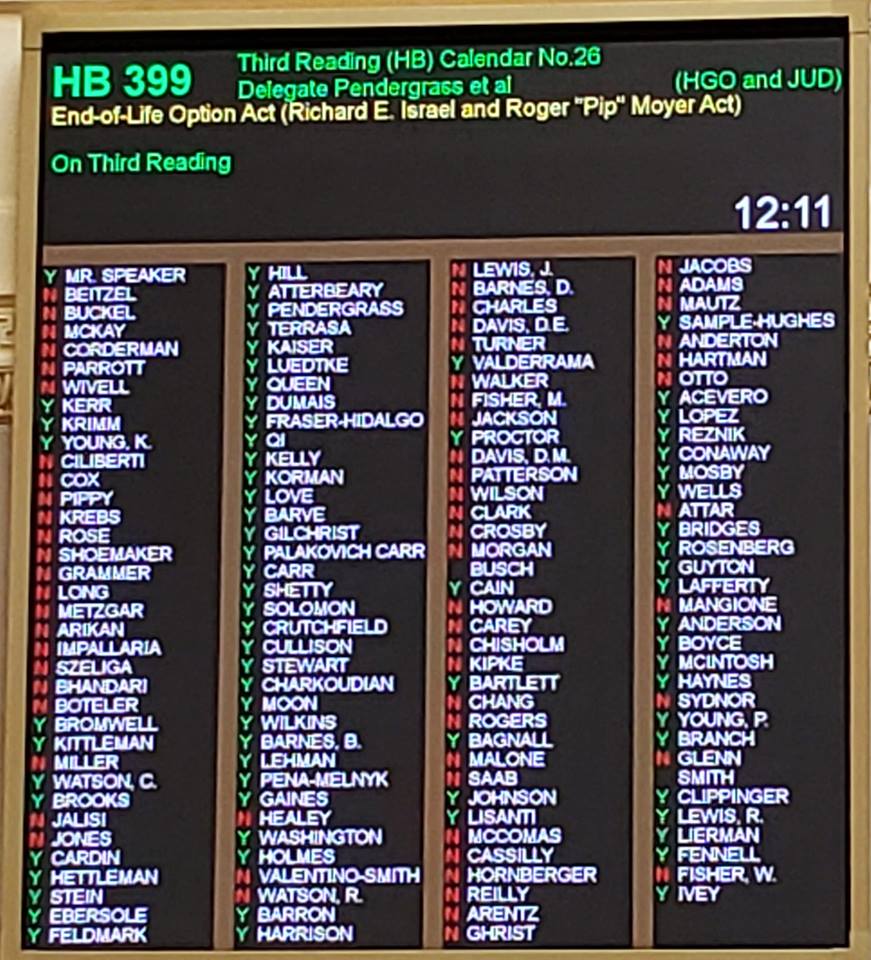By Diane Rey
For Maryland Reporter
Shuffling papers. Murmured conversations. The tap-tap-tap of people using laptops.
There’s a certain amount of ambient sound on the floor of the Maryland House of Delegates when the legislature is in session.
But on Thursday, a somber silence descended on the chamber as delegates listened to one after another of their colleagues stand and share personal stories in a debate about how the terminally ill should end their lives.
After close to 90 minutes of emotional testimony, the House narrowly passed HB399, formally titled the End-of-Life Option Act, making physician assisted suicide, as opponents prefer to call it, one step closer to becoming legal in the state. The vote was 74 to 66, three more than necessary for a constitutional majority.
About two dozen Democrats joined all the Republicans in opposing the bill.
This is the fourth time the legislature has taken up the measure, having failed to pass it out of committee in three previous years.
“I thank the body for compelling debate on a very sensitive issue. It was great on both sides,” said House Speaker Mike Busch after calling for the vote.
The bill is sponsored by Del. Shane E. Pendergrass, D-Howard, with 49 other delegates as co-sponsors. It’s cross-filed as SB0311 in the Senate with Sen. Will Smith, D-Montgomery, as lead sponsor and 18 senators as co-sponsors.
It allows a physician to prescribe life-ending drugs to a patient over age 18 who is terminally ill with less than 6 months to live, after the patient has made the request on at least three separate occasions and at least once in writing.
Personal autonomy
In the floor debate, some supporters argued for personal autonomy. Several opponents objected on moral or religious grounds. Many shared personal stories of suffering and loss and explained how those experiences affected their decision to vote either “red” or “green.”
One delegate questioned what amount of influence insurance companies would have over patients’ end-of-life decisions.
Del. Joseline Pena-Melnyk, D-Anne Arundel and Prince George’s, vice chair of the Health and Government Operations Committee, where the bill was assigned, said the question of what insurance companies will or won’t cover is not the subject of the bill.
“It doesn’t say they’ll be denied treatments” before receiving a prescription for lethal drugs, she said. “It does not preclude them from getting the help and treatment they need… It’s a conversation with the doctor, not the insurance company.”
Pena-Melnyk said “90% of people that are terminally ill under this bill are in hospice…They’re already having that discussion with their physician.”
A delegate from the Eastern Shore also questioned whether it was appropriate to use public money through Medicare and Medicaid for physician-assisted suicide when some life-giving treatments may not be covered.
Slippery slope
Del. Geraldine Valentino-Smith, D-Prince George’s, worried the bill was a “slippery slope” that would lead people to perceive they have a “duty” to die to save resources or prevent themselves from being a burden to others, or that the scope of the bill would be expanded in the future beyond the terminally ill.
House Minority Leader Nic Kipke questioned how the bill would affect vulnerable populations, such as the poor, people with mental illness or those in situations of domestic or elder abuse. Kipke said the bill lacks a psychological evaluation as a safeguard.
Heartfelt stories
While points of the bill were debated, much of the testimony consisted of heartfelt stories about personal illness and family loss.
Del. Eric Luedtke, D-Montgomery, choked up as he recounted his opposition to suicide after three members of his family tried to take their own lives. However, witnessing the pain his mother bore before she succumbed to cancer made him rethink his position.
“Despite my personal hatred for suicide, I began to ask myself what right did I have as a government official or her son to dictate how her life should end?…Should the government dictate to people that their only option is to die in pain? I don’t believe anymore that we have that right,” he said.
Del. Sandy Bartlett, D-Anne Arundel, shared her personal story of pain and suffering battling breast cancer. Others talked about friends, relatives and former colleagues who experienced extreme illness and were at the brink of death, who bounced back and continued living for months or years afterward.
“We don’t know what tomorrow holds,” said Del. Cheryl Glenn, D-Baltimore, who voted against the bill.
The bill must pass the Senate before it is sent to Gov. Larry Hogan, who has said he has struggled with the issue.
Reach Diane at [email protected].




Recent Comments